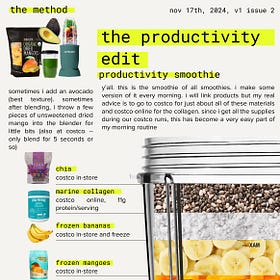If you are here, chances are that you need to over-step more.
Imposter syndrome is statistically higher among women and BIPOC communities, which are the demographics most likely to engage with my content. And women and BIPOC communities are particularly susceptible to feeling like imposters.
I talk about over-reaching as an antidote to imposter syndrome often. Recently, it dawned on me that over-stepping has been crucial to my modus operandi.
I have consistently posited that imposter syndrome is an emotional regulation issue (and that time management, burnout, and fear of opinions are manifestations of the issue). So you can imagine how interested I was in the research that reinforced my hypothesis.
The Imposter Cycle describes the following cyclical sequence of events:
Imposters are given an achievement-related task
The task leads to anxiety, self-doubt, and worry
Imposters either over-prepare or procrastinate
The task finally gets done, and temporary relief sets in
The relief discounts any positive reinforcement as a function of luck
The relief dissipates
The imposter feels like a fraud
Self-doubt calcifies into performance anxiety or depression
The cycle repeats
Individuals with the Impostor Phenomenon undermine their achievements and worry that they will be exposed as frauds.
The natural reaction to feeling unfit is to step down or feel unwelcome. And, frankly, biases among decision-makers may push you low on the list when it comes to workplace decisions—a phenomenon known as the similar-to-me effect, which, when unchecked, narrows career prospects for women.
Naturally, you have to over-step. You have to over-reach and over-step. You have to shut down the nagging thought that you are going too far by:
Asking for calendar time
Following up on the request
Asking directly for things you think you won’t be chosen for
Asking for feedback on how to improve.
Tactically:
Over-reaching is applying for the promotion; over-stepping is getting time with the hiring manager to ask what your gaps might be and aligning on a plan to close them
Over-reaching is deciding to write the book and studying success; over-stepping is emailing 100 agents, finding them all on LinkedIn or anywhere else, and shaking one loose for a deal
Over-reaching is identifying as the power-woman; over-stepping is finding mentors and sliding into their inbox to ask for time
Over-reaching has had the most consequential impacts on my life. From applying to NASA (wasn’t qualified, literally—the internship was for students of a different major), to applying to MIT (didn’t have the GPA, came from state schools), to starting a tech company (first boss: me), over-reaching has been definitive in shaping my life.
What the last few lines fail to pay homage to are the million failed attempts: the TED residency and Forbes 30 Under 30 spots I lost by a hair way back when, the failed deals, and the two-dozen architecture firms I walked into with a portfolio from Dumbo to the Upper West Side, only to get turned away. The colleges I did not get accepted to.
When bias works against you, you have to over-step.
👋 Hey, I'm Layla. Join me in my weekly newsletter, where I provide insights into enhancing leadership skills and increasing productivity. If you haven't subscribed yet, here's a recap of a few posts you may enjoy:
Recent posts you might enjoy
The productivity edit #2 | Nov 17th, 24
I am really big on protein in the morning, because it’s good for blood sugar and focus — two areas I actively manage. Protein intake influences brain health by supplying amino acids necessary for neurotransmitter production, like dopamine and serotonin, which regulate mood and focus. High-protein diets have been linked to improved cognitive performance …
People treat you how you treat yourself
Close your eyes and imagine who you admire. Who do you want to be more like? Now compare your behavior to that person’s. What is the delta? Probably bigger than you’d hoped.
Musings: Your fear of opinions is costly
When my 4-year-old recently told me, “Mama, someone said my teeth look big,” my first instinct was to reassure him that being different is okay. I started to say, “We are all made different and—” but stopped myself.









Absolutely inspiring to discern the distinction